|
|
|
Sort Order |
|
|
|
Items / Page
|
|
|
|
|
|
|
| Srl | Item |
| 1 |
ID:
117056
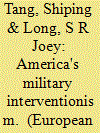

|
|
|
|
|
| Publication |
2012.
|
| Summary/Abstract |
By synthesizing material forces with ideational forces more organically via a social evolutionary approach, we advance a deeper understanding about post-World War II American military interventionism. We argue that post-World War II American military interventionism - that is, the American elites' and public's support for America's military intervention abroad - cannot be understood with ideational or psychological forces alone. Rather, two crucial material variables, namely, geography and aggregate power amplified by superior technological prowess, are indispensable for understanding the propensity for the United States to intervene militarily abroad. These two factors have powerfully shielded the American elites and public from the horrendous devastation of war. As a result, compared to their counterparts in other major states, American citizens and elites have tended to be less repelled by the prospect of war. The outcome is that since World War II the United States has been far more active in military intervention overseas than other major states.
|
|
|
|
|
|
|
|
|
|
|
|
|
|
|
|
| 2 |
ID:
117052
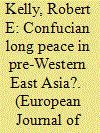

|
|
|
|
|
| Publication |
2012.
|
| Summary/Abstract |
International Relations theory about East Asia has increasingly argued that East Asia before Western penetration enjoyed a protracted peace. As explanations, a Chinese military hegemony would fit realist theory fairly well, while a cultural peace based on shared Confucian norms would be a significant anomaly. A Confucian Long Peace challenges widely held, albeit Eurocentric, realist presumptions including the perils of anarchy, the arms-racing and misperception of the security dilemma, and the regularity of power balancing. This article therefore investigates, first, whether such a peace did in fact exist, and, second, whether this might be attributed to Confucianism. A cultural peace theory requires a strong anti-war cultural norm and a shared sense of community. Skepticism is established by examining three comparative cultural spaces that nonetheless did not enjoy a culturally informed peace: the classical Greek city-state system, early modern Christendom, and the contemporary Arab state system. All were deeply riven and competitive. Nevertheless, empirical investigation of the last Chinese (Qing) dynasty before the Western arrival (1644-1839) demonstrates that it was remarkably peaceful toward its Confucian neighbors, while more 'normally' exploiting its power asymmetry against non-Confucian ones. Process-tracing specialized Chinese practices toward fellow Confucians suggests that the low Confucian war finding emanates from cultural restraint.
|
|
|
|
|
|
|
|
|
|
|
|
|
|
|
|
| 3 |
ID:
117055
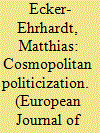

|
|
|
|
|
| Publication |
2012.
|
| Summary/Abstract |
Much of what can be subsumed under the label 'political cosmopolitanism' calls for the empowerment of international institutions because of increased global interdependencies. Surprisingly, however, few scholars have asked whether ordinary citizens share this way of thinking. Do people believe that international institutions are desirable because of their superior capacity to solve transnational problems? To address this question, falsifiable hypotheses about the quality of and scope conditions for a minimally defined 'public political cosmopolitanism' are derived from the literature and tested using the results of a representative survey of German citizens. I show that there is significant support for what I call the 'interdependence model' of cosmopolitan politicization: German citizens' perception of transnational interdependencies (in terms of functional sensitivity as well as moral commitments) fosters beliefs in the capacity of international institutions to solve problems. Remarkably, this relationship is moderated by citizens' sense of their own vulnerability, that is, their beliefs that the national government is incapable of solving such problems. The interdependence model has significant explanatory power, spanning different levels of education, and thus disproves claims that cognitive mobilization is a crucial scope condition for cosmopolitan politicization.
|
|
|
|
|
|
|
|
|
|
|
|
|
|
|
|
| 4 |
ID:
117054
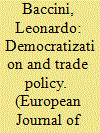

|
|
|
|
|
| Publication |
2012.
|
| Summary/Abstract |
I show that the process of democratization in developing countries constitutes an important factor in the formation of preferential trade agreements. Specifically, democratizing developing countries are more likely to form a preferential trade agreement with richer countries, whereas there is little evidence that democratic transition affects the probability of a developing country joining a preferential trade agreement with other developing countries. This result follows naturally from median voter preferences and the Heckscher-Ohlin and Stolper-Samuelson theorems. Put simply, the median voter gains from trading with the richer states and loses from trading with the other poor states. Since preferential trade agreements allow countries to waive the most-favored nation principle, the need for both trade openness and protectionism against competitors might explain why preferential trade agreements constitute one of the main features of the current wave of globalization. I quantitatively test this hypothesis using a newly compiled dataset that covers 135 developing countries from 1990 to 2007. An important implication of this article is that it could be more challenging than expected to combine domestic political equality with international economic equality.
|
|
|
|
|
|
|
|
|
|
|
|
|
|
|
|
| 5 |
ID:
117058
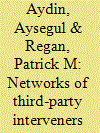

|
|
|
|
|
| Publication |
2012.
|
| Summary/Abstract |
With growing attention to peace-building in civil wars, scholars have increasingly focused on the role that international and regional organizations play in conflict resolution. Less attention has been paid to unilateral interventions undertaken by third-party states without the explicit consent of organizations and to the impact of unilateralism on how long civil wars last. In this article, we claim that unilateral interventions exert a cumulative impact on civil wars depending on interveners' interrelations. States with a cooperative rapport have an easier time in bringing civil wars to an end though they act unilaterally and follow their interests in the civil war environment, whereas states that compete for influence over war combatants prolong the fighting. Analysis results from post-1945 civil wars support our expectations and show that interveners supporting opposing sides of the war increase war duration. On the other hand, third-party states bandwagoning on the same side of a civil war are effective in stopping the fighting only when the intervening parties share similar preferences.
|
|
|
|
|
|
|
|
|
|
|
|
|
|
|
|
| 6 |
ID:
117057
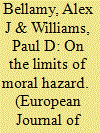

|
|
|
|
|
| Publication |
2012.
|
| Summary/Abstract |
Advocates of moral hazard theory argue that the 'responsibility to protect' causes genocidal violence that would not otherwise occur. After summarizing the main elements of the moral hazard approach, this article demonstrates that there is no empirical evidence to support the general claim that the 'responsibility to protect' is a remote cause of genocide. This is followed by an analysis of the conflicts in Bosnia, Kosovo and Darfur which demonstrates that moral hazard does not provide a plausible account of the proximate causes of genocidal violence in these cases. We suggest that a major part of the explanation for why moral hazard theory performs so badly is its reductionist account of the dynamics of armed conflict and its simplistic understanding of the dynamics of provocation.
|
|
|
|
|
|
|
|
|
|
|
|
|
|
|
|
| 7 |
ID:
117053
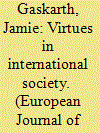

|
|
|
|
|
| Publication |
2012.
|
| Summary/Abstract |
Although there has been a significant growth in the literature on the ethics of international politics in recent years, much of this has focused on the normative structure of international relations and has downplayed the role of individuals in constituting the understandings and actions in this practice. However, individual agency and accountability are apparent in recent world events. Meanwhile, developments in moral philosophy have increasingly led scholars to re-examine the role that individual character traits - virtues - have in affecting how norms are selected and operationalized. Building on these insights, I argue here that a fully realized appreciation of the morality of international politics requires us to consider what character traits - virtues - its individual participants are expected to exhibit to support and realize its norms. To do so, I begin by outlining how the virtues are deemed to underpin ethical practice and highlight two forms of analysis that may be used to explore this: decision-oriented virtue ethics and constitutive virtue ethics. I then suggest that these can be used to analyse the ethical foundations of international society. Specifically, I adopt a constitutive virtue ethics approach to show how the virtues help to constitute international society using the case study of the establishment of the International Criminal Court. In the process, I aim to highlight both the extent to which the virtues are a feature of the rhetoric of global politics, and - more importantly - how they play a significant role in normative practice.
|
|
|
|
|
|
|
|
|
|
|
|
|
|
|
|
|
|
|
|
|